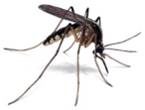
Mosquitoes are known to spread vector borne diseases such as dengue fever and malaria. In Indonesia the incident rate of reported dengue fever cases increases almost every year. Syngenta provide a proven solution to overcome this problem in Indonesia.
ECONOMIC IMPORTANCE
- Mosquitoes are vectors that carry disease-causing viruses and parasites from person to person without exhibiting symptoms themselves
- The principal mosquito-borne diseases are the viral diseases yellow fever, dengue fever and Chikungunya transmitted mostly by the Aedes aegypti and malaria carried by the genus Anopheles sp
- Dengue is transmitted by several species of mosquito within the Aedes genus, principally Aedes aegypti
- The Dengue virus has four different types; infection with one type usually gives lifelong immunity to that type, but only short-term immunity to the others
- Subsequent infection of dengue with a different type is believed to increase the risk of severe complications
- Malaria is transmitted by the female Anopheles to humans and is caused by eukaryotic protists of the genus Plasmodium
- Four species of Plasmodium can infect and be transmitted by humans
- Most dangerous form of malaria is also caused by Plasmodium falciparum
- Malaria is also caused by Plasmodium vivax, Plasmodium ovale and Plasmodium malariae, which is generally a milder disease that is rarely fatal
MOSQUITO MANAGEMENT PROGRAM
- As there are no vaccines for malaria and dengue, prevention is done by reducing the habitat and the number of mosquitoes and limiting the exposure to bites
- Space spraying and indoor residual spraying with a long lasting insecticide
- Larvicide may be used to control mosquito larvae
- Use barrier screens on windows and doors
- Use mosquito repellent during outdoor activity
MAJOR MOSQUITO SPECIES IN INDONESIA
- Aedes aegypti: spread the dengue fever to human
- Anopheles aconitus: known as malaria mosquito, that can spread malaria disease to human
